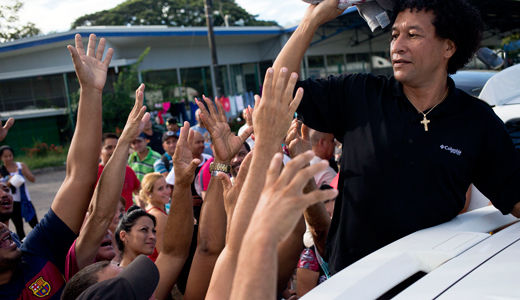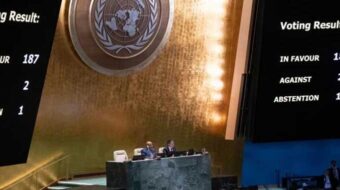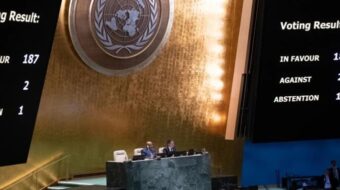
A dispute between Nicaragua and Costa Rica over the fate of Cuban migrants heading to the United States highlights the injustice and unfairness of the U. S. Cuban Adjustment Act (CAA) of 1966. Through that law, any Cuban citizen arriving on U.S. soil gains permanent residence after a one-year stay. The legislation has served U. S. propaganda purposes by creating a flood of immigrants ready to be portrayed as refugees fleeing political repression.
According to the Pew Research Center, 15,341 Cubans arrived in the United States during the first nine months of fiscal 2014 and 27,296 during the comparable period of fiscal 2015, a 78 percent increase. The burgeoning number of people leaving Cuba, primarily for economic reasons, stems from fear that the CAA will soon be repealed. Indeed, with diplomatic relations now re-established, many observers in Cuba and the United States alike are saying that getting rid of the CAA is a prerequisite for truly normal bi-national relations.
In recent years Cubans on the way to the United States have been heading first to Quito, Ecuador and then moving northward to the U. S. border with Mexico. They rely less and less on the once well traveled ocean route across the Florida Straits. Not only are the small boat crossings often deadly, but also the U.S. Coast Guard, on intercepting migrants at sea must, according to a U. S. Cuban agreement of the 1990s, return them to Cuba.
Ecuador is attractive as the only Latin American country allowing Cubans to enter without a visa. The travelers leave Cuba legally, but their border crossings north from Quito are unauthorized. Moving by bus, foot, boat, and air, they pay bribes and tolls and hire guides known as “coyotes.” The parade came to a halt on November 10 just inside Costa Rica’s southern border after police there arrested 12 coyotes. Until then, from 300 to 350 Cubans had been arriving every day and 3000 of them were now stranded.
Costa Rica’s government soon issued the migrants a temporary visa allowing them to proceed on to Nicaragua. On November 15, however, the Nicaraguan government barred their entering the country and since then almost 4000 Cubans have been stuck on the Costa Rican side of the border. Nicaraguan soldiers using tear gas repelled 800 migrants who attempted a mass border crossing.
Responding to the impasse, the foreign ministers of El Salvador, Belize, Costa Rica, Guatemala, Honduras, Nicaragua, Panama, and the Dominican Republic – all members of the System of Central American Integration (SUCS) – held a closed door conference on November 24 in El Salvador. The foreign ministers of México, Colombia, Cuba, and Ecuador attended as guests.
Speaking to reporters afterwards, Salvadoran foreign minister Hugo Martínez noted general agreement “that the countries meeting here were not responsible for setting off that emigration.” He condemned U. S. “measures that discriminate against other immigrants.” Costa Rican foreign minister Manuel González cited consensus as to “the inappropriateness of the U. S. Cuban Adjustment Law … which … converts the United States into a magnet.” Cuban Foreign Minister Bruno Rodriguez, also in attendance, concurred.
Nicaraguan Vice Chancellor Dennis Moncada indicated his country would “not lend legitimacy to illegal policies that cause harm, suffering, and economic loss to human beings, entire families, governments, and the peoples of Cuba and the region.” He blamed the United States, adding that “our countries lack resources for dealing with this new threat to our national security.”
Earlier, Costa Rica had proposed creation of a “humanitarian corridor” for facilitating Cubans’ travel across Central America. The SUCS conference rejected the idea, refusing to condone the illegal nature of the migrants’ passage through the region. Rather than issue a joint statement, the delegates called upon each affected nation to attend to its own borders and national security.
The Cuban government invited the migrants to return. The stand-off has surely renewed Latin American awareness of the CAA and must be causing embarrassment within U. S. government circles. Such effects may add momentum to efforts finally to end the CAA.
On November 26, Ecuador took action toward alleviating the rush of Cubans leaving Quito for the United States: beginning on December 1, immigration officials will be requiring Cubans to possess a 90 – day tourist visa in order to enter the country. Interim foreign minister Xavier Lasso indicated Cubans will have to provide extra personal information on their visa application. Presumably their “special visa” is aimed at excluding persons planning to embark upon the long trip to the U. S. border. He explained that, “We are doing this to stop violations of human rights and even loss of lives.” Lasso asked that the United revise its policy of awarding citizenship to Cubans who’ve just arrived there.
Two odd quirks of the story deserve attention. Although a Cuban citizen’s presence in the United States is almost always legal, the process of entering may not be. The U. S. embassy in Havana, formerly the Interests Section, has held back on issuing entry visas with the result that many would – be migrants must rely on the CAA.
Additionally, the dominant U.S. media rarely mention the CAA, thus discouraging debate on what many see as a misbegotten and now archaic piece of legislation. Apparently the New York Times is continuing in that vein. In a detailed report on the affair in Costa Rica, the Times reporter does not name the law, but instead refers to “questions about American regulations that favor Cubans” and to “special migration rules.”
Photo: A Costa Rican man tosses donated clothing to Cuban migrants outside the immigration office in Peñas Blancas, Costa Rica, Nov. 17. Cuban officials blamed the United States for instigating a surge in the number of Cuban migrants attempting to reach the U.S. through Central America amid ongoing efforts to normalize relations. Esteban Felix | AP












Comments